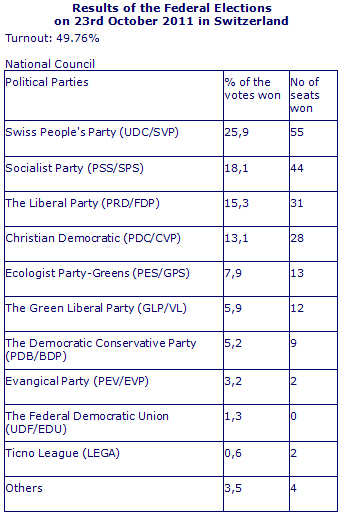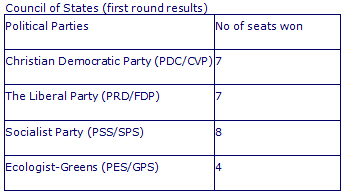News
Corinne Deloy,
Fondation Robert Schuman,
Helen Levy
-

Available versions :
EN

Corinne Deloy
Fondation Robert Schuman
Helen Levy
On 23rd October, for the first time in 20 years, the Swiss People's Party, which was running favourite, recorded a decline in the Swiss federal elections. The populist party, led by Toni Brunner, won 25.9% of the vote, which was below the 30% target it had set, a result that no Swiss party has ever achieved since 1919, the year when proportional voting came into force. With 55 seats on the National Council (7 less than in the previous federal elections on 21st October 2007), the Swiss People's Party is still Switzerland's leading political party. "The rise of the Swiss People's Party over the last few years has now come to a halt," declared Gilbert Casasus, political expert at the University of Fribourg. In his opinion "the first lesson to be learned in this election is that the Swiss political system is stable. There has not been any great change," he said.
The Socialist Party (PSS/SPS) led by Christian Levrat came second. It won 18.1% of the vote and 44 seats (+1). The party is therefore the only one not to have suffered due to the emergence of new parties in the centre.
Some parties in the centre continue to decline. The Liberal Party (PRD/FDP) won 15.3% of the vote and 31 seats (=). Its chair Fulvio Pelli, was only just re-elected in Tessin. "The Swiss have punished us. There is a problem in how we see things. Our party works pragmatically, but the population has negative pre-conceived ideas," he declared when the results were announced. The Christian Democratic Party (PDC/CVP) led by Christophe Darbellay won 13.1% of the vote 28 sets (- 3). The change in the party's strategy, which recently decided to give up nuclear energy, did not succeeded in preventing its decline that has been ongoing for the last few years. Voters are turning away from the parties that are gradually drawing away from their base and which do not carry a clear enough message that is out of in line with the way society is developing.
The major winners in this turbulence has been the Green-Liberal Party (GLP/VL), an ecologist movement that supports liberalism in the economic domain, established in 2007 by Martin Bäumle, and the Democratic Conservative Party (PBD/BDP), a party that was formed after it split from the Swiss People's Party, established in 2008 and led by Hans Grunder. The two parties won 5.9% (12 seats, + 9) and 5.2% of the vote (9 seats, + 9) respectively.
The Liberal Greens, who have an especially high profile in German speaking Switzerland (only one MP in the French speaking part) may form their own parliamentary group now. "These parties are attractive because they are new and they still haven't done anything bad," stresses Georg Lutz, a political scientist from the Centre of Competences in Social Sciences at the University of Lausanne. "These parties share 80-90% of the same policies as the Christian Democratic Party, but they are new and therefore very attractive," adds the party's chair, Christoph Darbellay. "I hope that we shall be able to continue working constructively with these new parties," he added. The Liberal Green Party and the Democratic Conservative Party can now play the role of king-makers.
Another surprise in these federal elections was the defeat suffered by the Ecologist-Greens Party (PES/GPS), led by Ueli Leuenberger, notably in the German speaking cantons. It won 7.9% of the vote, far from the 10% and the 13 seats (- 7) it had been targeting. This result seems to herald the end of its ambitions as far as the Federal Council is concerned. With the ecologists' score the left emerges weakened from the federal elections that took place on 23rd October.
"Between the socialists on the left and the Swiss People's Party on the right, a new trend is emerging in the centre. This brings the polarisation that has marked Swiss politics over the last decade, to an end. This is a first in the Confederation's history, for which the Greens and the government parties have paid dearly," reads an editorial in the Swiss daily La Tribune de Genève. In these times of international economic crisis the Swiss have therefore shown their rejection of the traditional parties. The newspaper, Le Temps, explains the decline of the Swiss People's Party as follows: "The party reflects the image of the hard right at a time when the country sees that it will have to come up with solutions in the centre to face an economic situation that is becoming increasingly difficult and uncertain."
Turnout totalled 49.76%, nearly 1 point more (0.96) than that recorded in the previous federal elections on 21st October 2007. Moreover this is the highest turnout in 36 years.
The stagnation of the Swiss People's Party is, in part, a result of the split it suffered in 2008. Under the impetus of Eveline Widmer Schlumpf, the party's moderate wing quit the SVP to form the Democratic Conservative Party. The populist party also seems to have suffered the competition of two local nationalist parties: the Ticino League (LEGA), a right-wing protest movement led by Giuliano Bignasca, which won 2 seats at the National Council and the Geneva Citizens' Movement (MCG), which is against the presence of French trans-border workers, which has won 1 seat.
At the Council of States the results of the 1st round of voting granted 8 seats to the Socialist Party, 7 to the Liberal Party and 7 to the Christian Democratic Party. The Ecologist-Greens Party won 4 seats. The Swiss People's Party sent in several of its heavyweights – Christoph Blocher, Toni Brunner and Caspar Baader – to the elections at the Council of States. But the voting majority voting method – in the upper chamber does not favour the extremist parties. In Zurich, former Federal Councillor and Vice-President of the SVP failed to win a seat. In Saint Gall the party's chair has to run again.
A second round will take place in 13 of the country's 26 cantons: Valais, Tessin, Bern, Zurich, Luzern, Vaud, Schaffhouse, Argovia, Uri, Schwyz, Soleure, Thurgovia and Saint-Gall.
The new parliament will be responsible for electing the 7 members of the Federal Council on 14th December – this is the executive body in Switzerland. After the results of the federal elections this election will be an extremely open one. We should remember that the head of the federal department (ministry) for Foreign Affairs and present President of the Republic, Micheline Calmy-Rey (PSS/SPS) has announced that she does not intend to stand again. The seats of two Liberal federal councillors - Johann Schneider-Amman, present head of the federal department for the Economy and Didier Burkhalter, head of the federal department for the Interior – are now in danger whilst Eveline Widmer-Schlumpf (head of the federal department for Finance) (PBD/BDP) may finally retain her seat.
"Parliament has never elected the government according to this party. The time is right to come up with a new magic formula," writes La Tribune de Genève.
 Source : Internet Site of the TV channel SFR
Source : Internet Site of the TV channel SFR
 Source : Internet Site of the TV channel SFR
Source : Internet Site of the TV channel SFR
On the same theme
To go further
Elections in Europe
Corinne Deloy
—
15 April 2025
Elections in Europe
Corinne Deloy
—
25 February 2025
Elections in Europe
Corinne Deloy
—
18 February 2025
Elections in Europe
Corinne Deloy
—
28 January 2025

The Letter
Schuman
European news of the week
Unique in its genre, with its 200,000 subscribers and its editions in 6 languages (French, English, German, Spanish, Polish and Ukrainian), it has brought to you, for 15 years, a summary of European news, more needed now than ever
Versions :



